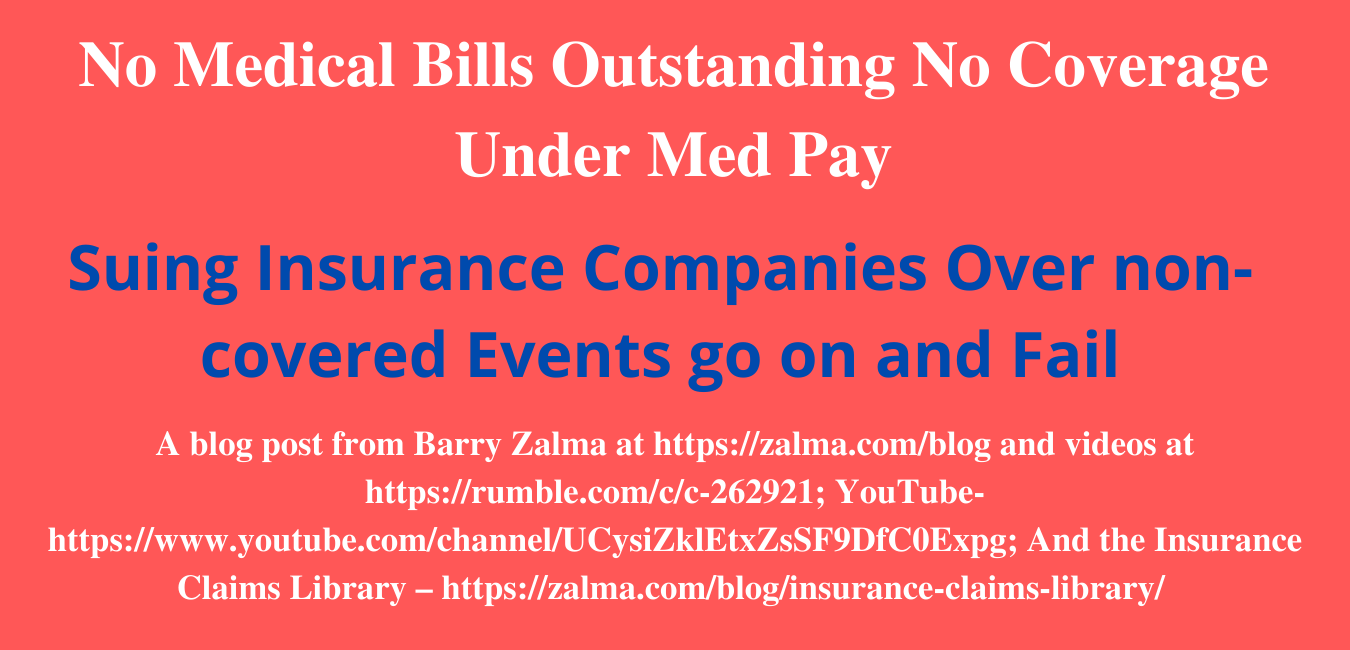-
News Feed
- EXPLORE
-
Pages
-
Groups
-
Events
-
Blogs
-
Marketplace
-
Offers
-
Jobs
-
Developers
No Medical Bills Outstanding no right to Med Pay

Suing Insurance Companies Over Non-Covered Events go on and Fail
Read the full article at https://www.linkedin.com/pulse/medical-bills-outstanding-coverage-under-med-pay-zalma-esq-cfe and at https://zalma.com/blog plus more than 3950 posts.
Courtney Young appealed the circuit court order that granted Shelter Mutual Insurance Company’s motion for summary judgment and dismissed Young’s complaint against Shelter with prejudice. Young contended that the circuit court erred by granting summary judgment to Shelter and should have, instead, granted his motion to nonsuit his complaint without prejudice so he could try another way to sue the insurer. In Courtney Young v. Shelter Mutual Insurance Company, No. CV-20-201, 2021 Ark.App. 391, Court of Appeals of Arkansas, Division I, IV (October 20, 2021) the court wasted its time ruling on an appeal after the Arkansas Supreme Court already ruled on the same issue in favor of an insurer.
FACTS
Young was injured in an accident when he was a passenger in a Ford Explorer. Young sued both the estate of the deceased driver and Shelter, which provided the insurance coverage for the Explorer. By the end of 2017, Young had settled all of his claims except the claim against Shelter for $5,000 in medical benefits. On March 7, 2018, Shelter moved for summary judgment and asked that Young’s complaint be dismissed. Shelter appended exhibits demonstrating that Young’s health insurance provider paid for his medical expenses and the remaining balances were written off as required by federal law; thus, Young owed no money to any medical provider. Shelter contended that under the contractual terms of the insurance policy covering the Explorer, Young was not entitled to any medical benefits from Shelter.
On December 5, 2019, the Arkansas Supreme Court handed down Crockett & Carter v. Shelter Mutual Insurance Co., 2019 Ark. 365, 589 S.W.3d 369.
The circuit court granted Shelter’s motion for summary judgment and dismissed Young’s complaint with prejudice.
ANALYSIS
Although Young correctly stated that the supreme court has been resolute in holding that the right to nonsuit outlined by Rule 41 is absolute and may not be denied by the circuit court so long as the right is asserted before the “final submission” of the case to the jury or the court. If a case is submitted to the circuit court on a motion for summary judgment and an adverse ruling has been announced to the plaintiff, then the case has been “submitted” for purposes of Rule 41. Once submitted, the circuit court has discretion to decide whether to grant a voluntary nonsuit.
ZALMA OPINION
Suing insurance companies may be considered by some as a means of getting rich but here, to deal with a $5,000 claim for medical bills that were not owed by the plaintiff, seems to be an egregious waste of time and money. Once the Supreme Court ruled there was no reason to go on.
© 2021 – Barry Zalma
We are 100% funded for October.
Thanks to everyone who helped out. 🥰
Xephula monthly operating expenses for 2024 - Server: $143/month - Backup Software: $6/month - Object Storage: $6/month - SMTP Service: $10/month - Stripe Processing Fees: ~$10/month - Total: $175/month
- Art
- Causes
- Crafts
- Crime
- Dance
- Drinks
- Film
- Finance
- Fitness
- Food
- Games
- Gardening
- Health
- Home
- Literature
- Music
- Networking
- Paranormal
- Other
- Politics
- History
- News
- Party
- Science
- Religion
- Shopping
- Sports
- SyFy
- Politically Incorrect
- Philosophy
- Theater
- Technology
- Wellness



